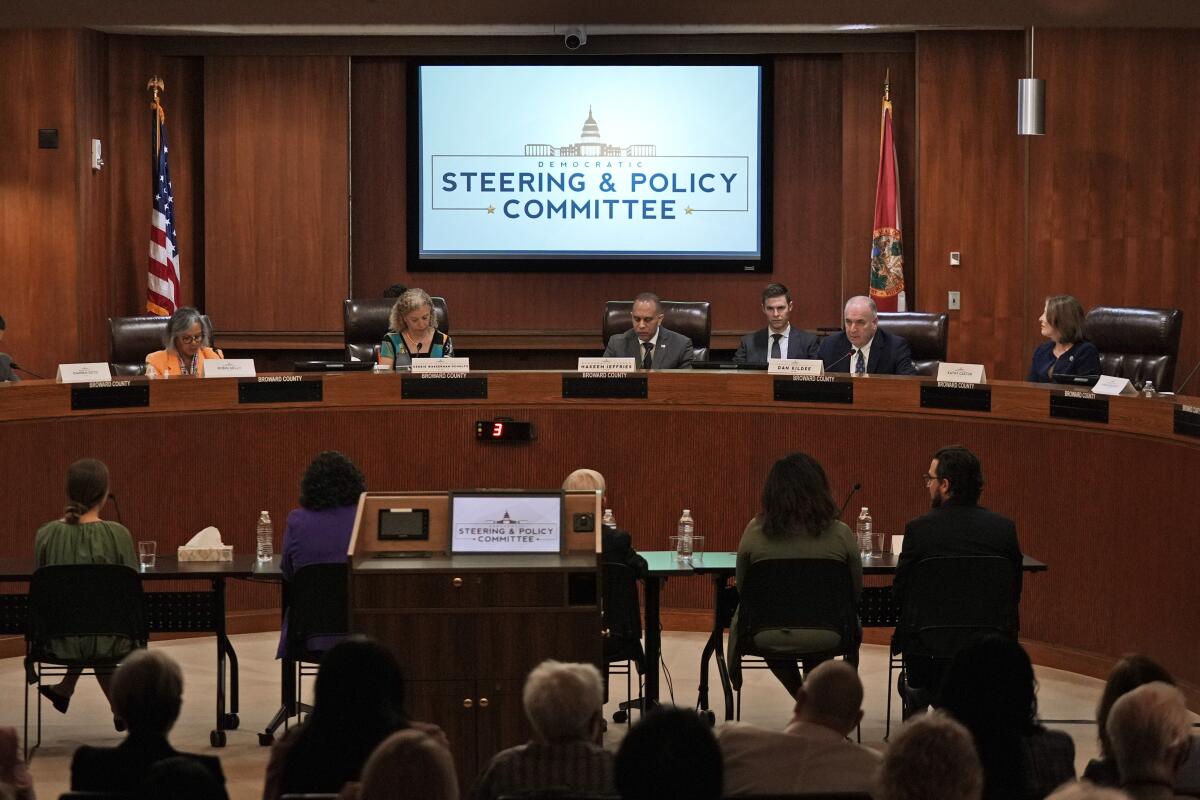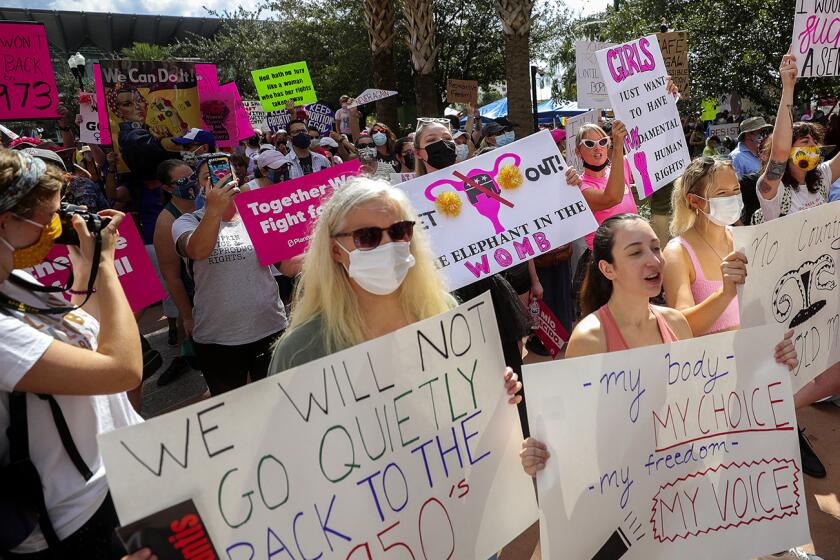Florida’s stricter abortion ban could put more pressure on clinics in other states

- Share via
The drive to Bristol, Va., from Jacksonville, Fla., takes more than eight hours. It’s more than 10 from Orlando and closer to 14 hours from Miami. Despite that distance, Bristol Women’s Health Center is preparing for an influx of women from Florida seeking abortions when a stricter ban takes effect there next month.
For many people who otherwise would have obtained abortions in Florida, the clinic in southwest Virginia will become the closest practical option — as it already is for a swath of the South after a Florida policy change that’s expected to resonate far beyond the state.
“The majority of the patients we do serve are coming from banned states,” said Karolina Ogorek, the clinic’s administrative director. “I think that Florida will just become another one of the states that we serve.”
On April 1, the Florida Supreme Court upheld the state’s current ban on abortion after 15 weeks of pregnancy — a move that will allow another, stricter ban to take effect May 1. The new law will make abortion illegal in the state after six weeks’ gestation — before many women realize they’re pregnant. The ban includes exceptions for pregnancies caused by rape, incest or human trafficking, or that threaten a woman’s life or physical health, as well as for fatal fetal anomalies.
In a separate ruling that could reverse the ban, the court also cleared the way for a referendum on November’s ballot that will let Florida’s voters decide whether they want a state constitutional amendment that would allow abortion until a fetus is viable outside the womb.
The court has paved the way for a ban after six weeks of pregnancy, before many women know they are pregnant, but voters will soon have a say.
Stephanie Loraine Piñeiro, executive director of the Florida Access Network, which helps pay for abortion care for women in the state, said that the new law, coupled with a 24-hour waiting period for abortion, would amount to a “total ban” on the procedure in practical terms.
And getting to a provider elsewhere, she said, will drive the average cost of abortion, including transportation, lodging, meals, child care and clinic fees, to around $4,000. That’s about twice what it is now. That will put more strain on groups like hers — which often hits its budget limit well before the end of the month — as they shift to helping people get care elsewhere.
People could end up stranded if they can’t get time off work, afford travel, arrange child care or lack documentation to travel, Piñeiro said.
“The people who are most marginalized are going to continue to not have access,” she said.
She said she expects some of the state’s clinics to close for lack of patients.
Florida residents are now an average of 20 miles from a facility that provides abortion, said Caitlin Myers, an economics professor at Middlebury College in Vermont who studies the effect of abortion bans. But when the new ban takes effect, those seeking an abortion after six weeks of pregnancy will have to travel an average of 584 miles for a suitable clinic.
And that gets patients only to North Carolina, where two in-person visits are required 72 hours apart to receive an abortion — which in most cases isn’t allowed after 12 weeks of pregnancy.
It’s more than 100 miles farther to Virginia.
Staffers from World Central Kitchen, chef José Andrés’ humanitarian aid group trying to get food to Palestinians in Gaza, were killed in Israeli airstrikes.
Some areas already have long drives to the nearest abortion providers — eight hours from San Antonio in Texas to Santa Teresa, N.M., for instance, and nine from New Orleans to Carbondale, Ill., or from Houston to Wichita, Kan. But its geography means southern Florida will be even farther from in-person abortion access after six weeks than other highly populated parts of the United States.
In Georgia and South Carolina, which have bans that begin after about six weeks, and in Ohio, which had a similar ban for a time, the number of abortions was cut approximately in half while those policies were in effect.
It’s not only Florida residents who will be affected by the state’s new ban.
“Florida is a really important state for Southern abortion access, and it has been a state that has experienced a surge in travelers from Georgia and Alabama, Mississippi, Louisiana who are traveling [to facilities outside] those states, avoiding near total or six-week bans,” Myers said.
Of the 84,000 abortions provided in Florida last year, about 7,700 were for people who lived out of state. Now most patients like them will travel farther for access, too.
The total number of abortions in the country has been roughly stable since the U.S. Supreme Court overturned Roe vs. Wade and ended the nationwide right to abortion in 2022. But much has changed.
Supreme Court justices question whether a group of Texas doctors had legal standing to sue over access to abortion pills through pharmacies or through the mail.
Far more abortions are being done with pills rather than surgery, with a major increase in prescriptions through telehealth appointments — including patients in states with bans consulting providers where such prescriptions are legal. But the laws protecting those medications could face legal tests. And the U.S. Supreme Court is already considering an effort to roll back approval of one of the two drugs usually used in combination for medication abortion.
Planned Parenthood centers in Florida have been preparing for the stricter ban to take effect.
Laura Goodhue, executive director of the Florida Alliance of Planned Parenthood Affiliates, said their clinics have implemented rapid blood tests to detect pregnancy earlier, while increasing education and contraception programs and ramping up efforts to help people travel elsewhere for abortion.
“We’re doing what we can,” she said. “But ... as we’ve seen in other states, it’s still going to have a devastating impact on our public health system.”
Since states began enforcing abortion bans after the 2022 ruling, the clinic in Bristol has added appointment slots in the afternoons, and on Saturdays and some Sundays — and has adjusted to the reality that patients could be late due to traffic jams as far away as Atlanta.
“In order for them to come to Virginia, there’s a lot of planning involved,” Ogorek said. “It’s not just taking a few hours off of work and driving 20 minutes.”
Mulvihill writes for the Associated Press.
More to Read
Sign up for Essential California
The most important California stories and recommendations in your inbox every morning.
You may occasionally receive promotional content from the Los Angeles Times.
















